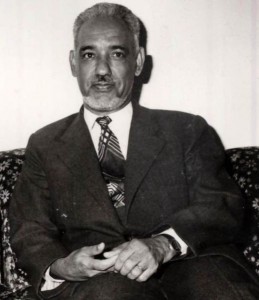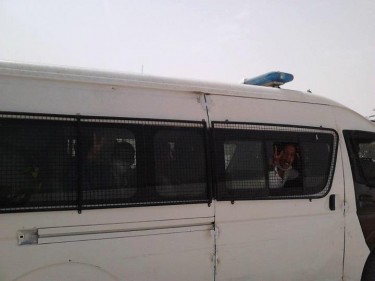July 10, 2012, marked the 34th anniversary of the first military coup [1] in Mauritania. In 1978, the military overthrew president Moktar Ould Daddah [2], Mauritania's first president after achieving independence from France in 1960.
Since then the country has experienced a succession of military coups, the latest of which was carried out by Brigadier General Mohamed Ould Abdel Aziz [3], who overthrew President Sidi Ould Cheikh Abdallahi [4], Mauritania's first elected civilian president, on August 6, 2008 [5].
Mauritanian activists remembered the anniversary by blogging and tweeting about it, and criticising military rule in Mauritania.
 [6]
[6]Moktar Ould Daddah, 1977. Image from Romanian Communism Online Photo Collection, via Wikimedia Commons.
The blogger at the Boutilimit Today blog (which takes its name from the hometown [7] of the president overthrown in 1978) recalled what happened after the coup [8] [ar]:
بدأت السلطات سياسة الإقصاء الممنهجة ضد ولاية الترارزة بشكل خاص، وضد مدينة بوتلميت بشكل أخص فقد قررت النخبة العسكرية الجديدة، تحويل تلك المدينة إلى ” معتقل لأبنائهما كان إخوة الرئيس ولد داداه، وأقاربه إضافة إلى الأطر والمثقفين المنحدرين من ولايته أول المستهدفين، وتواصلت الاعتقالات لتشمل كثيرا من الموريتانيين، فيما كان الأستاذ أحمد ولد داداه يقضي إقامته الجبرية في بوتلميت والتي مكنته من حفظ القرآن الكريم، كان الأمير احبيب ولد أحمد سالم يعلك لجام الأسى وهو سجين محمول في مؤخرة 404 تشق به وهاد المذرذرة إلى نواكشوط.
The political authorities began to systematically exclude the
Trarza Region [9], and Boutilimit, in particular. The new military elite decided to turn the town into a prison for its sons, who were the brothers and relatives of President Ould Daddah. Intellectuals who came from the region were also amongst the first targets.
Ahmed Ould Daddah [10] [half-brother of Moktar Ould Daddah] was under house arrest in Boutilimit, which allowed him to memorise the Holy Qur'an. The Emir Habib Ould Ahmed Salem [emir of Trarza] brewed in his sorrow as he was carried in the back of a truck on the way to Nouakchott through the
Mederdra [11] plains.
The activist Baba Ould Brahim wrote about the anniversary on his blog Surakh Al Watan [12] (“The Scream of The Nation”):
إن الحديث عن الانقلابات في موريتانيا يعني الحديث عن خمسة عشر انقلاب وجد البعض منها سبيله في الاستيلاء على السلطة بينما فشل الآخر في ذلك ,بدأت بانقلاب 1978م وظلت مستمرة ومحكوم بها كقدر محتوم أعناق الشعب الموريتاني حتى اليوم.ويمكن اختزالها عموما ,و تقسيما إلى ثلاث مراحل أساسية تبدأ أولاها من 1978م حتى 1991م حيث بداية المرحلة الثانية التي انتهت بانقلاب 2005 الذي شكل هو الآخر بداية للمرحلة الثالثة التي لم تنتهي بعد.لولا الاختلاف في الأشخاص والأسماء لقيل أن موريتانيا عرفت انقلابا واحدا ,وذلك لاتحاد جميع الانقلابات في الأسباب , والتشابه في المسار ,والوصول إلى نفس النتائج.
كان العاشر من يوليو 1978 موعد موريتانيا مع أول انقلاب من طرف مجموعة من ضباط جيشها , دوافعهم في ذلك كما قالوا الحرب التي يخوضها الجيش ضد البوليساريو في ظروف وصفوها بالصعبة , فهو غير مؤهل لذلك من حيث السلاح والمئونة والتدريب…
لقد تلازم مع هذا الانقلاب ,القضاء على جميع المظاهر المدنية في الدولة , وهو ما اتضح جليا من خلال الميثاق الذي يمنع التعددية السياسية , ويحرم على المدنيين ممارسة السياسة.
To talk about coups in Mauritania is to talk about fifteen coups, some of which found a way to seize power, while others failed. It began with the coup in 1978 and continued, and it remains a fate governing the lives of Mauritanians until today. They can be summarised, and divided into three basic phases. The first was from
1978-1991 [13], the
second phase [14] lasted until the
coup in 2005 [15], and third has still not finished. If not for the difference in people and names, we could say that Mauritania has seen a single coup, as all the coups have had the same reason, and have been similar in the way they were carried out, and have achieved the same results.
July 10, 1978 was Mauritania's appointment with the first coup by a group of army officers, who claimed that their motive was the
war waged by the army [16] against
Polisario [17] in conditions they described as difficult, with no chance of more weapons, supplies, or training.
Something inherent to each coup has been the elimination of all aspects of the civil state, made clear in the
constitutional charter [18], which prohibits political pluralism and stops civilians from participating in politics.
 [19]
[19]Arrest of activists of 25 February movement. From Mouvement du 25 Février Facebook page.
The 25 February movement [20] activist Med Lemine Echvagha tweeted about the anniversary:
@eddennine [21]: بعد ايام تكمل #موريتانيا سنتها الرابعة والثلاثين تحت حكم العسكر، يسقط…يسقط حكم العسكر #ارحل_عزيز
In a few days’ time Mauritania will complete its thirty-fourth year under military rule. Down with military rule, [General] Aziz get out
The blogger Sidi Al Tib Ould Mojteba wrote:
@mojteba [22]: تؤلمني ذكرى هذا اليوم المشؤوم، ويحز في النفس أن نخبة بلادي لا تدرك جسامة الخطب وهول الكارثة.. يسقط يسقط حكم العسكر #موريتاني
The anniversary of this fateful day hurts me, and it's painful to see that the elite of my country are unaware of the gravity of the matter and the horror of this disaster… Down with Mauritanian military rule
The activist Baba Ould Hourma commented on the revival of the July 10 anniversary by the 25 February movement:
@hourmababa [23]: وقفة حركة ٢٥ فبراير في ذكرى أول انقلاب عسكري يعكس وعيا شموليا بجذور المعضلة السياسية في #موريتانيا وتجاوزا لأطروحات القوى التقليدية في البلد
The position of the 25 February movement on the anniversary of the first military coup reflects the comprehensive awareness of the roots of the political dilemma in Mauritania and a disregard for the traditional powers in the country
 [6]
[6]